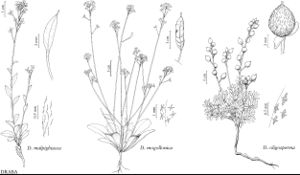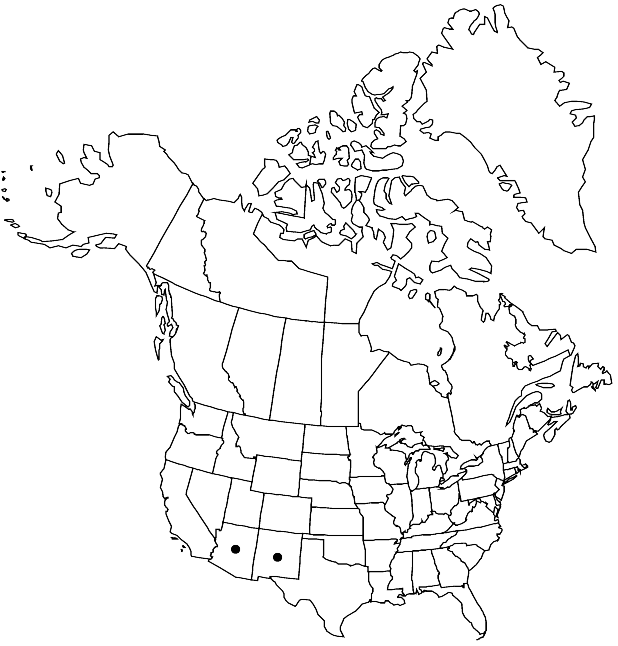Draba mogollonica
Bot. Gaz. 6: 157. 1881.
Annuals, biennials, or, rarely, perennials; (short-lived); not scapose. Stems usually branched, (0.6–) 1.2–2.8 (–3.6) dm, pubescent proximally, glabrous distally, trichomes simple, 0.3–1.3 mm, and 2–4-rayed, 0.1–0.6 mm. Basal leaves rosulate; petiole (0–2 cm), densely pubescent, (trichomes simple and 2–4-rayed, not ciliate); blade spatulate to obovate or oblanceolate, (1.5–) 3–8 (–10) cm × 7–25 (–33) mm, margins dentate to denticulate, surfaces pubescent with long-stalked, cruciform, and fewer 2-rayed or 3-rayed trichomes, 0.1–0.6 mm. Cauline leaves 1–3; sessile; blade oblong to ovate, margins entire, surfaces pubescent as basal. Racemes 12–40 (–51) -flowered, ebracteate, elongated in fruit; rachis not flexuous, usually glabrous, rarely proximally with relatively few trichomes. Fruiting pedicels horizontal to divaricate, straight, (6–) 9–18 (–22) mm, usually glabrous, rarely sparsely pubescent as stem proximally. Flowers: sepals oblong, 2.5–3.5 mm, sparsely pubescent, (trichomes simple and 2–4-rayed); petals yellow, spatulate, (5–) 6–8.5 × 2.2–3.5 mm; anthers oblong, 0.7–0.9 mm. Fruits linear-elliptic to elliptic-lanceolate, slightly twisted, flattened, 6–19 × 2.5–3.5 mm; valves glabrous or pubescent, trichomes simple and short-stalked, 2 (–4) -rayed, 0.07–0.3 mm; ovules 24–36 per ovary; style (0.8–) 1–2.2 mm. Seeds oblong, 1–1.4 × 0.7–0.8 mm. 2n = 22.
Phenology: Flowering Apr–May.
Habitat: Rock outcrops and rocky slopes in oak-pine woodlands and mixed conifer communities
Elevation: 1500-2300 m
Discussion
Draba mogollonica is distributed in New Mexico primarily in the Mogollon and neighboring mountains in Catron, Grant, Sierra, and Socorro counties. It is reported herein for the first time from Arizona from Greenlee County, based on Barneby 2297 (NY), Rollins & Rollins 93113 (CAS, GH), and Windham 2918 (MO, UT). The only published chromosome count (n = 16, compiled in S. I. Warwick and I. A. Al-Shehbaz 2006) is erroneous; counts by M. D. Windham (unpubl.) from five populations representing all of the above-mentioned counties in Arizona and New Mexico consistently agree on n = 11.
Selected References
None.
Lower Taxa
"elongated" is not a number."thick" is not a number.

